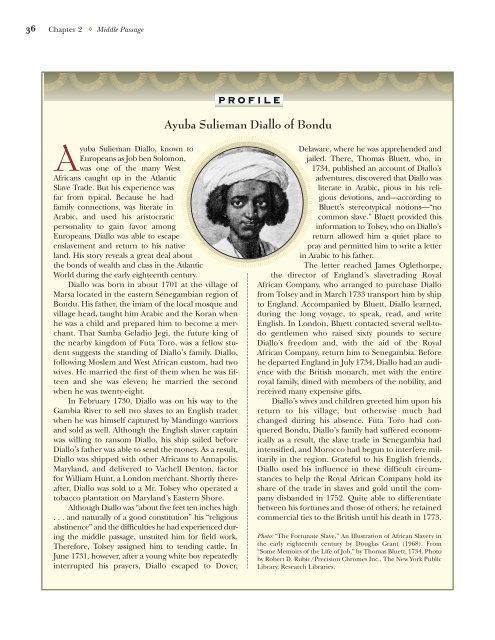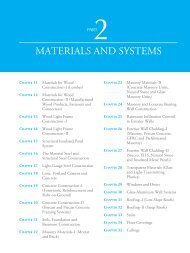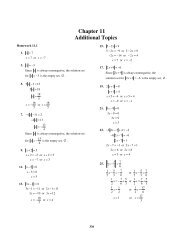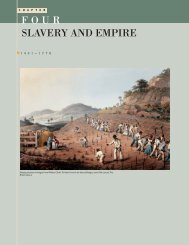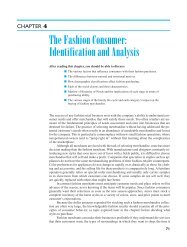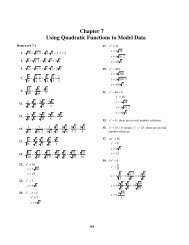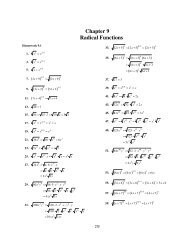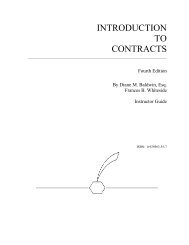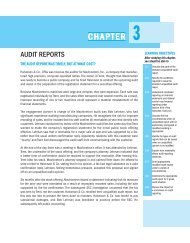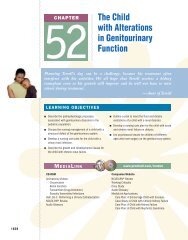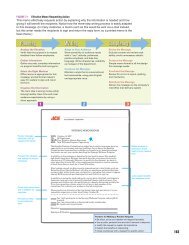You also want an ePaper? Increase the reach of your titles
YUMPU automatically turns print PDFs into web optimized ePapers that Google loves.
36 Chapter 2 <strong>Middle</strong> <strong>Passage</strong><br />
Ayuba Sulieman Diallo, known to<br />
Europeans as Job ben Solomon,<br />
was one of the many West<br />
Africans caught up in the Atlantic<br />
Slave Trade. But his experience was<br />
far from typical. Because he had<br />
family connections, was literate in<br />
Arabic, and used his aristocratic<br />
personality to gain favor among<br />
Europeans, Diallo was able to escape<br />
enslavement and return to his native<br />
land. His story reveals a great deal about<br />
the bonds of wealth and class in the Atlantic<br />
World during the early eighteenth century.<br />
Diallo was born in about 1701 at the village of<br />
Marsa located in the eastern Senegambian region of<br />
Bondu. His father, the imam of the local mosque and<br />
village head, taught him Arabic and the Koran when<br />
he was a child and prepared him to become a merchant.<br />
That Samba Geladio Jegi, the future king of<br />
the nearby kingdom of Futa Toro, was a fellow student<br />
suggests the standing of Diallo’s family. Diallo,<br />
following Moslem and West African custom, had two<br />
wives. He married the first of them when he was fifteen<br />
and she was eleven; he married the second<br />
when he was twenty-eight.<br />
In February 1730, Diallo was on his way to the<br />
Gambia River to sell two slaves to an English trader<br />
when he was himself captured by Mandingo warriors<br />
and sold as well. Although the English slaver captain<br />
was willing to ransom Diallo, his ship sailed before<br />
Diallo’s father was able to send the money. As a result,<br />
Diallo was shipped with other Africans to Annapolis,<br />
Maryland, and delivered to Vachell Denton, factor<br />
for William Hunt, a London merchant. Shortly thereafter,<br />
Diallo was sold to a Mr. Tolsey who operated a<br />
tobacco plantation on Maryland’s Eastern Shore.<br />
Although Diallo was “about five feet ten inches high<br />
. . . and naturally of a good constitution” his “religious<br />
abstinence” and the difficulties he had experienced during<br />
the middle passage, unsuited him for field work.<br />
Therefore, Tolsey assigned him to tending cattle. In<br />
June 1731, however, after a young white boy repeatedly<br />
interrupted his prayers, Diallo escaped to Dover,<br />
PROFILE<br />
Ayuba Sulieman Diallo of Bondu<br />
Delaware, where he was apprehended and<br />
jailed. There, Thomas Bluett, who, in<br />
1734, published an account of Diallo’s<br />
adventures, discovered that Diallo was<br />
literate in Arabic, pious in his religious<br />
devotions, and—according to<br />
Bluett’s stereotypical notions—“no<br />
common slave.” Bluett provided this<br />
information to Tolsey, who on Diallo’s<br />
return allowed him a quiet place to<br />
pray and permitted him to write a letter<br />
in Arabic to his father.<br />
The letter reached James Oglethorpe,<br />
the director of England’s slavetrading Royal<br />
African Company, who arranged to purchase Diallo<br />
from Tolsey and in March 1733 transport him by ship<br />
to England. Accompanied by Bluett, Diallo learned,<br />
during the long voyage, to speak, read, and write<br />
English. In London, Bluett contacted several well-todo<br />
gentlemen who raised sixty pounds to secure<br />
Diallo’s freedom and, with the aid of the Royal<br />
African Company, return him to Senegambia. Before<br />
he departed England in July 1734, Diallo had an audience<br />
with the British monarch, met with the entire<br />
royal family, dined with members of the nobility, and<br />
received many expensive gifts.<br />
Diallo’s wives and children greeted him upon his<br />
return to his village, but otherwise much had<br />
changed during his absence. Futa Toro had conquered<br />
Bondu, Diallo’s family had suffered economically<br />
as a result, the slave trade in Senegambia had<br />
intensified, and Morocco had begun to interfere militarily<br />
in the region. Grateful to his English friends,<br />
Diallo used his influence in these difficult circumstances<br />
to help the Royal African Company hold its<br />
share of the trade in slaves and gold until the company<br />
disbanded in 1752. Quite able to differentiate<br />
between his fortunes and those of others, he retained<br />
commercial ties to the British until his death in 1773.<br />
Photo: “The Fortunate Slave,” An Illustration of African Slavery in<br />
the early eighteenth century by Douglas Grant (1968). From<br />
“Some Memoirs of the Life of Job,” by Thomas Bluett, 1734. Photo<br />
by Robert D. Rubic/Precision Chromes Inc., The New York Public<br />
Library, Research Libraries.


